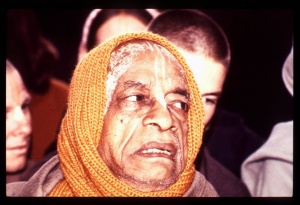CC Madhya 20.276 (1975)

A.C. Bhaktivedanta Swami Prabhupada
TEXT 276
- tabe mahat-tattva haite trividha ahaṅkāra
- yāhā haite devatendriya-bhūtera pracāra
SYNONYMS
tabe—thereafter; mahat-tattva haite—from the total material energy; tri-vidha—three kinds of; ahaṅkāra—egotism; yāhā haite—from which; devatā—of predominating deities; indriya—of the senses; bhūtera—and of material elements; pracāra—expansion.
TRANSLATION
"First the total material energy is manifest, and from this arise the three types of egotism, which are the original sources from which all demigods [controlling deities], senses and material elements expand.
PURPORT
The three types of egotism (ahaṅkāra) are technically known as vaikārika, taijasa and tāmasa. The mahat-tattva is situated within the heart, or citta, and the predominating Deity of the mahat-tattva is Lord Vāsudeva (Bhāg. 3.26.21). The mahat-tattva is transformed into three divisions: (1) vaikārika, egotism in goodness (sāttvika-ahaṅkāra), from which the eleventh sense organ, the mind, is manifest and whose predominating Deity is Aniruddha (Bhāg. 3.26.27-28); (2) taijasa, or egotism in passion (rājasa-ahaṅkāra), from which the senses and intelligence are manifest and whose predominating Deity is Lord Pradyumna (Bhāg. 3.26.29-31); (3) tāmasa, or egotism in ignorance, from which sound vibration (śabda-tanmātra) expands. From the sound vibration, the sky (ākāśa) is manifest and, the senses, beginning with the ear, are also manifest (Bhāg. 3.26.32). Of these three types of egotism, Lord Saṅkarṣaṇa is the predominating Deity. In the philosophical discourse known as the Sāṅkhya-kārikā, it is stated: sāttvika ekādaśakaḥ pravartate vaikṛtād ahaṅkārāt-bhūtādes tan-mātraṁ tāmasa-taijasādy-ubhayam.